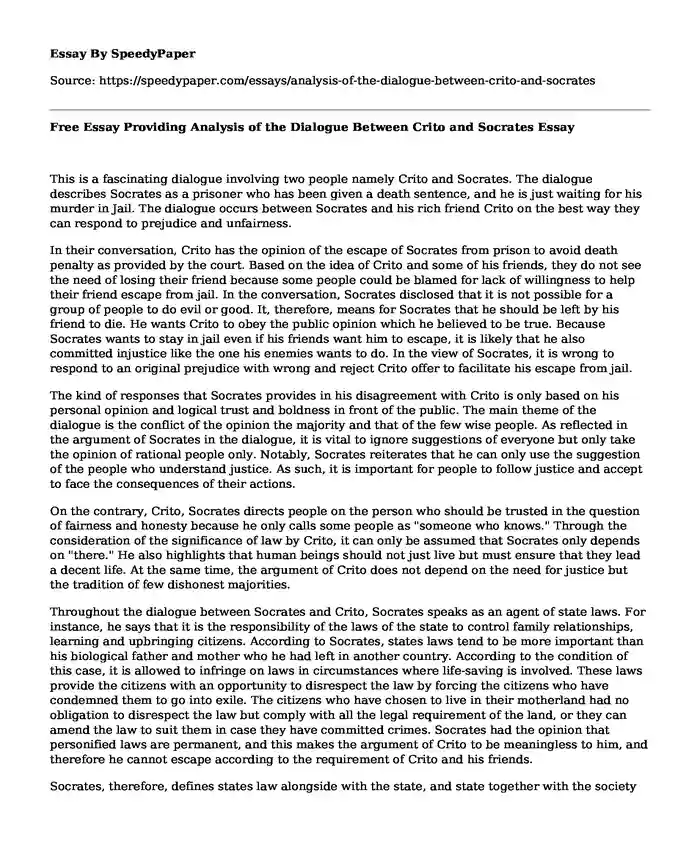
| Type of paper: | Essay |
| Categories: | Philosophers |
| Pages: | 4 |
| Wordcount: | 831 words |
This is a fascinating dialogue involving two people namely Crito and Socrates. The dialogue describes Socrates as a prisoner who has been given a death sentence, and he is just waiting for his murder in Jail. The dialogue occurs between Socrates and his rich friend Crito on the best way they can respond to prejudice and unfairness.
In their conversation, Crito has the opinion of the escape of Socrates from prison to avoid death penalty as provided by the court. Based on the idea of Crito and some of his friends, they do not see the need of losing their friend because some people could be blamed for lack of willingness to help their friend escape from jail. In the conversation, Socrates disclosed that it is not possible for a group of people to do evil or good. It, therefore, means for Socrates that he should be left by his friend to die. He wants Crito to obey the public opinion which he believed to be true. Because Socrates wants to stay in jail even if his friends want him to escape, it is likely that he also committed injustice like the one his enemies wants to do. In the view of Socrates, it is wrong to respond to an original prejudice with wrong and reject Crito offer to facilitate his escape from jail.
The kind of responses that Socrates provides in his disagreement with Crito is only based on his personal opinion and logical trust and boldness in front of the public. The main theme of the dialogue is the conflict of the opinion the majority and that of the few wise people. As reflected in the argument of Socrates in the dialogue, it is vital to ignore suggestions of everyone but only take the opinion of rational people only. Notably, Socrates reiterates that he can only use the suggestion of the people who understand justice. As such, it is important for people to follow justice and accept to face the consequences of their actions.
On the contrary, Crito, Socrates directs people on the person who should be trusted in the question of fairness and honesty because he only calls some people as "someone who knows." Through the consideration of the significance of law by Crito, it can only be assumed that Socrates only depends on "there." He also highlights that human beings should not just live but must ensure that they lead a decent life. At the same time, the argument of Crito does not depend on the need for justice but the tradition of few dishonest majorities.
Throughout the dialogue between Socrates and Crito, Socrates speaks as an agent of state laws. For instance, he says that it is the responsibility of the laws of the state to control family relationships, learning and upbringing citizens. According to Socrates, states laws tend to be more important than his biological father and mother who he had left in another country. According to the condition of this case, it is allowed to infringe on laws in circumstances where life-saving is involved. These laws provide the citizens with an opportunity to disrespect the law by forcing the citizens who have condemned them to go into exile. The citizens who have chosen to live in their motherland had no obligation to disrespect the law but comply with all the legal requirement of the land, or they can amend the law to suit them in case they have committed crimes. Socrates had the opinion that personified laws are permanent, and this makes the argument of Crito to be meaningless to him, and therefore he cannot escape according to the requirement of Crito and his friends.
Socrates, therefore, defines states law alongside with the state, and state together with the society and the needs of different citizens. He explained that the state, society, and the laws are only meant to improve the well-being of the people. Socrates considers states laws as something indigenous for a group of people such as their parents. It is, therefore, significant to know that Plato's Socrates is a staunch follower of a conventional Greek polis which cannot differentiate the state from humanity and communal life and personality of a person.
Crito could not change his mind to allow Socrates to stay in jail. He maintains his unprincipled behavior and refuses to accept the opinion of Socrates who wants to follow the idea of the unwise majority. This kind of behavior is associated with aristocratism. It is, therefore, not necessary for someone to believe that union of universal and individual preached in the conversation was as a result of the aristocracy. From the beginning of this dialogue, it was not easy to think about the comparison between the opinion of the majority and wise minority. Based on the information in the dialogue, Socrates believes that his argument is based on reason, but he has no any other opportunity to exploit despite Crito's demand to rescue him from facing the death penalty.
Cite this page
Free Essay Providing Analysis of the Dialogue Between Crito and Socrates. (2022, May 03). Retrieved from https://speedypaper.com/essays/analysis-of-the-dialogue-between-crito-and-socrates
Request Removal
If you are the original author of this essay and no longer wish to have it published on the SpeedyPaper website, please click below to request its removal:
Popular categories




